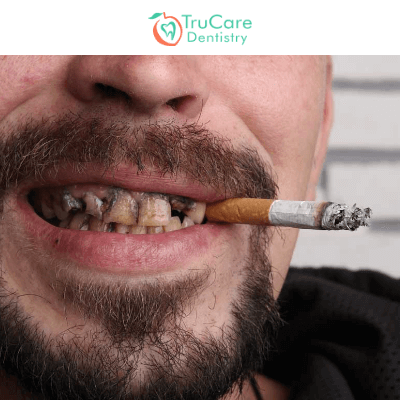
Everyone is well conscious of the harmful effects of smoking on the lungs and heart. We often see these warnings on cigarette packets and various media platforms. However, what’s less discussed but equally damaging is the impact of smoking on one’s oral health. It can result in multiple health issues, including mouth cancer, tooth loss, gum disease, and discoloration. It may wreak havoc on your teeth and gums, leading to oral health problems. In this blog post, we will dive into how smoking affects your oral health and emphasize the importance of quitting smoking for the well-being of your teeth and gums.
Consequences on Your Teeth and Oral Health
Smoking has significant results on your teeth and overall oral health. Here are some of the effects:
Stained Teeth: The staining and yellowing of teeth is one of smoking’s most apparent effects on oral health. Tobacco products contain tar and nicotine, which can slowly accumulate on tooth enamel and leave behind unsightly yellow or brown stains. It may cause you to smile inconveniently and seriously lower your self-esteem.
Diminished Sense of Taste and Smell: Regular smoking can dull your senses, mainly taste and smell, leading to decreased enjoyment of food. It is due to the smoke’s constant interaction with your taste buds and olfactory receptors.
- Impaired Healing After Oral Surgery: Smoking increases the risk of developing oral health problems and can also interfere with the healing process after dental procedures or oral surgery. It impairs blood flow, depriving oral tissues of necessary nutrients and oxygen, thus slowing the healing process and increasing the risk of post-surgical complications.
- Increased Plaque and Tartar: It encourages the buildup of plaque, an adherent bacterial film, on your teeth. Plaque eventually becomes tartar, which can only be removed by a dental specialist.
- Slowed Bone Healing: This Impairs bone health and can slow the recovery of bone-related conditions, such as jawbone infections or osteoporosis.
- Lousy Breath: Lousy Breath can cause chronic bad breath and halitosis. The chemicals in tobacco products leave a foul odor in your mouth and contribute to dry mouth, reduced saliva production, and gum disease. These factors create an ideal environment for bacteria to thrive, leading to persistent bad breath that is hard to mask.
- Gum Disease: Periodontal disease, often known as gum disease, is significantly increased by smoking. The weakened immune response and harmful chemicals in cigarettes can lead to gum inflammation, infection, and eventual tooth loss. Smokers will likely develop advanced gum disease and experience more severe symptoms than non-smokers.
- Oral Cancer: Perhaps the most severe consequence of smoking on oral health is the increased risk of oral cancer. Tobacco smoke contains numerous carcinogens that can damage your mouth and throat cells. Nowadays, Oral Cancer is more common in smokers than non-smokers, and the risk rises with smoking frequency and duration. Because it can be fatal, oral cancer requires rigorous therapy, such as surgery, radiation, and chemotherapy.
- Tooth Decay: Mainly contributes to tooth decay by promoting the growth of harmful bacteria and compromising the integrity of tooth enamel. The reduced saliva flow caused by smoking creates a dry mouth environment conducive to bacterial growth. Furthermore, smoking weakens the protective enamel layer, making teeth more vulnerable to decay and cavities.
- Complications with Dental Procedures: Smoking can interfere with the success of various dental procedures. For example, dental implants have a higher failure rate in smokers due to the impaired healing process and increased risk of infections. Similarly, smokers who require root canal treatment may experience more complications, including an increased risk of reinfection.
To protect your teeth and gums, you must stop smoking. By quitting smoking, you can improve your overall well-being. Additionally, regular dental check-ups, maintaining good oral hygiene practices, and adopting a healthy lifestyle can help mitigate the damage caused by smoking.
Final Words!
Smoking affects almost every part of your oral health, from the aesthetics of your smile to severe diseases such as oral cancer. The best way to prevent these effects is to quit smoking and maintain good oral hygiene. It’s also crucial to visit your dentist regularly for check-ups, as early detection can often lead to better outcomes in case of gum disease or oral cancer. The path to quitting smoking can be challenging, but the benefits are immense for your oral health, overall health, and well-being. Remember, it’s never too late to quit and start making positive changes toward a healthier lifestyle.
If you are looking for professional teeth whitening services in Roswell, GA, or neighboring areas such as Alpharetta, Dunwoody, Marietta, Milton, Sandy Springs, or Woodstock, schedule an appointment at TruCare Dentistry. To know more about our services, call (678) 321-7575 or visit our website.
